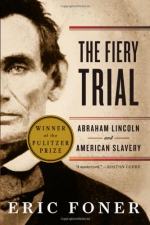
|
| Name: _________________________ | Period: ___________________ |
This test consists of 15 multiple choice questions and 5 short answer questions.
Multiple Choice Questions
1. Abraham Lincoln's wife was the daughter of a what?
(a) Actor.
(b) Painter.
(c) Banker.
(d) Farmer.
2. What was a short-lived political party in the United States active in the 1848 and 1852 presidential elections?
(a) The Whig Party.
(b) The Republican Party.
(c) The Free Soil Party.
(d) The Democratic Party.
3. In what year did the United States of America annex the Republic of Texas?
(a) 1865.
(b) 1846.
(c) 1845.
(d) 1848.
4. What was a political party of the United States during the era of Jacksonian democracy, and was operating from the early 1830s to the mid-1850s?
(a) The Tea Party.
(b) The Republican Party.
(c) The Democratic Party.
(d) The Whig Party.
5. Where did Lincoln make a speech in Springfield that included a discussion on the violence that surrounded the abolitionist movement in Chapter 1?
(a) The Philadelphia Museum.
(b) The Center for Policy.
(c) The New York Museum.
(d) The Young Men's Lyceum.
6. There are well documented trips Lincoln made down the Ohio and Mississippi Rivers in both 1828 and what year?
(a) 1818.
(b) 1840.
(c) 1861.
(d) 1831.
7. What political party's socially liberal and progressive platform is largely considered center-left in the contemporary U.S. political spectrum?
(a) The Whig Party.
(b) The Republican Party.
(c) The Tea Party.
(d) The Democratic Party.
8. For what state was John C. Fremont a U.S. Senator?
(a) Ohio.
(b) Kentucky.
(c) California.
(d) Kansas.
9. What temporarily neutralized the issue of slavery and undercut the Free Soil Party's no-compromise position?
(a) The Compromise of 1850.
(b) The Compromise of 1840.
(c) The Compromise of 1961.
(d) The Compromise of 1812.
10. In the late 1850s, Lincoln argued that what would be much more profitable if brought to the South because the workers would much better motivated to work if they were promised wages at the end of the day?
(a) Free labor.
(b) Colonialization.
(c) Labor unions.
(d) Slavery.
11. Who was the 14th President of the United States?
(a) Franklin Pierce.
(b) Zachary Taylor.
(c) Andrew Jackson.
(d) Millard Fillmore.
12. When was Abraham Lincoln born?
(a) 1809.
(b) 1825.
(c) 1800.
(d) 1814.
13. Henry Clay represented what state in both the Senate and the House of Representatives?
(a) Indiana.
(b) Illinois.
(c) Kentucky.
(d) Louisiana.
14. The Opinion of the Court in Dred Scott v. Sandford was written by what U.S. Chief Justice?
(a) Zachary Taylor.
(b) Henry Clay.
(c) Millard Fillmore.
(d) Roger B. Taney.
15. Britain banned the importation of African slaves in its colonies in what year?
(a) 1772.
(b) 1807.
(c) 1782.
(d) 1759.
Short Answer Questions
1. When did the Louisiana Purchase take place?
2. Who was the 13th President of the United States?
3. In what year did Dred Scott accompany his owners to Missouri?
4. In what year did Abraham Lincoln assume the Presidency of the United States?
5. In what state was James K. Polk born?
|
This section contains 408 words (approx. 2 pages at 300 words per page) |

|




